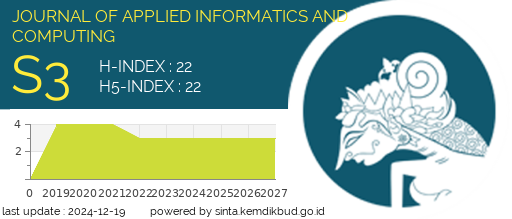Identifikasi Fitur Laptop beserta Orientasinya dengan Metode Apriori dan Lexicon-Based
DOI:
https://doi.org/10.30871/jaic.v1i2.508Keywords:
Identifikasi Fitur, Apriori, Orientasi Fitur, Lexicon-Based, Opinion MiningAbstract
Perkembangan laptop saat ini sangat pesat. Para produsen menggunakan media sosial misalnya fan page di Facebook untuk mempromosikan produknya. Semakin banyaknya pilihan membuat seseorang kesulitan dalam menentukan suatu laptop bagus atau tidak, direkomendasikan atau tidak. Review-review dan komentar-komentar yang ada di fan page tentang merek-merek laptop baru bisa dijadikan sebagai pengetahuan untuk menentukan apakah laptop baru tersebut bagus atau tidak. Jumlah review dan komentar yang ada di fan page sangat banyak sehingga diperlukan proses otomatisasi. Untuk keperluan tersebut digunakan opinion mining mencakup identifikasi target opini dan penentuan orientasinya. Identifikasi target opini digunakan untuk mengetahui fitur-fitur laptop yang dibicarakan dalam sebuah komentar sedangkan penentuan orientasi digunakan untuk menentukan apakah komentar bersifat positif atau negatif.
Data yang digunakan untuk penelitian ini diambil dari data fans page Facebook yang kemudian dianalis menggunakan metode Apriori untuk menghasilkan fitur laptop sebagai target opini dan metode Lexicon-based untuk menentukan orientasi fitur laptop, apakah berorientasi positif atau negatif. Penelitian juga menghasilkan kesimpulan dari data review dan komentar yang telah diproses.
Downloads
References
J. Bahisindra, 2015, "Aplikasi Analisis Sentimen dengan Metode Lexicon-Based Untuk Menilai Produk Smartphone Baru", Teknik Informatika, Politeknik Negeri Batam, 2015.
R. Gusnaldy, "Aplikasi Menentukan Topik Pembahasan suatu Produk pada Twitter", Teknik Informatika, Politeknik Negeri Batam, 2015.
K.Khan, B. Baharudin, A. Khan, A. Ullah, "Mining Opinion Components from Unstructured Reviews: A review", Journal of King Saud University- Computer and Information Sciences, 2014.
L. Zhang, B. Liu, "Identifying noun product features that imply opinions", in Proceedings of the 49th Annual Meeting of the Association for Computational Linguistics: Human Language Technologies: short papers, vol. 2. Association for Computational Linguistics, 2011, pp. 575-580.
B. Liu, "Sentiment analysis and subjectivity", in Indurkhya, N., Damerau, F.J., (Eds.), Handbook of Natural Language Processing, 2010, pp. 627"“666.
Erwin, "Analisis Market Basket dengan Algoritma Apriori dan FP-Growth", Jurnal Generic, 2009.
L. Ferreira, N. Jakob, I. Gurevych, A comparative study of feature extraction algorithms in customer reviews. Paper presented at the Semantic Computing, 2008.
M. Hu, B. Liu, "Mining and summarizing customer reviews", in Proceedings of the tenth ACM SIGKDD international conference on Knowledge discovery and data mining, 2004, pp. 168"“177.
K. Dave, S. Lawrence, D. M. Pennock, "Mining the peanut gallery: opinion extraction and semantic classification of product reviews", in www'03 Proceedings of the 12th international conference on World Wide Web, 2003.
Downloads
Published
How to Cite
Issue
Section
License
Authors who publish with this journal agree to the following terms:
- Authors retain copyright and grant the journal right of first publication with the work simultaneously licensed under a Creative Commons Attribution License (Attribution-ShareAlike 4.0 International (CC BY-SA 4.0) ) that allows others to share the work with an acknowledgement of the work's authorship and initial publication in this journal.
- Authors are able to enter into separate, additional contractual arrangements for the non-exclusive distribution of the journal's published version of the work (e.g., post it to an institutional repository or publish it in a book), with an acknowledgement of its initial publication in this journal.
- Authors are permitted and encouraged to post their work online (e.g., in institutional repositories or on their website) prior to and during the submission process, as it can lead to productive exchanges, as well as earlier and greater citation of published work (See The Effect of Open Access).











